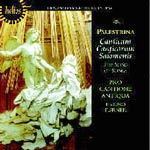
Palestrina: The Song of Songs
 $45.00
Low Stock
add to cart
$45.00
Low Stock
add to cart
GIOVANNI PIERLUIGI da PALESTRINA
Palestrina: The Song of Songs
Pro Cantione Antiqua / Bruno Turner
[ Hyperion Helios / CD ]
Release Date: Saturday 1 June 2002
This item is only available to us via Special Import.
'an excellently balanced and natural-sounding recording' (Penguin Guide to Compact Discs)
'One of Palestrina's most sublime and expressive works ... an excellently balanced and natural-sounding recording'
(Penguin Guide to Compact Discs)
'Voici un disque de toute beauté pour fêter Palestrina'
(Répertoire, France)
"There are far too many poems with no other subject than love
of a kind quite alien to the Christian faith."
In this way Palestrina began the dedication to Pope Gregory XIII of his Fourth Book of Motets. He continued with an apology that has seemed to some modern historians to be pure hypocrisy. The composer 'blushed and grieved' that he was one of those whose musical art had been lavished upon such love-poems and that he had been in company with those who were ruled by passion and corrupted by their youthfulness.
But this was not the first time that Palestrina had claimed to suffer a bad conscience about the use of his composer's gifts in the service of 'light and vain ideas'. Indeed, in 1569 at the age of about forty-four, he regarded himself as getting elderly and assured another of his dedicatees and his public that his gifts would henceforth be devoted to things 'dignified and serious, worthy of a Christian soul'.
When in 1584 the Roman printer Alessandro Gardano brought out Motettorum Quinque Vocibus LIBER QUARTUS there was no mention on the title page that the contents were drawn entirely from what the Latin Bible calls Canticum Canticorum. In his dedication Palestrina follows his apology with this resolution: 'But as what is past cannot be altered nor deeds undone, I have changed my purpose'. Recently, he explains, he had laboured upon poems 'written of the praises of our Lord Jesus Christ and His most Holy Mother the Virgin Mary' (a reference to his Madrigali spirituali of 1581), and now upon poems containing the divine love of Christ and His spouse the soul, indeed the 'Songs of Solomon' (Salomonis nimirum cantica). In the numerous later editions from 1587 to 1613, the title pages become more explicit, with phrases like motettorum ex canticis Salomonis or ex cantico canticarum (sic).
Note: Cover may differ from that shown
Tracks:
Osculetur me osculo oris sui [2'52]
Trahe me post te [2'45]
Nigra sum sed formosa [3'09]
Vineam meam non custodivi [1'50]
Si ignoras te, o pulchra [2'58]
Pulchrae sunt genae tuae [3'23]
Fasciculus myrrhae dilectus meus [2'15]
Ecce tu pulcher es [2'43]
Tota pulchra es, amica mea [2'16]
Vulnerasti cor meum [3'07]
Sicut lilium inter spinas [3'39]
Introduxit me rex in cellam [2'08]
Laeva eius sub capite meo [2'24]
Vox dilecti mei [2'11]
Surge, propera, amica mea [2'17]
Surge amica mea, speciosa mea [2'36]
Dilectus meus mihi [2'18]
Surgam et circuibo civitatem [1'58]
Adiuro vos, filiae Hierusalem [4'04]
Caput eius aurum optimum [3'06]
Dilectus meus descendit [2'13]
Pulchra es amica mea [2'17]
Quae est ista quae progreditur [2'53]
Descendi in hortum meum [2'57]
Quam pulchri sunt gressus tui [2'26]
Duo ubera tua [3'44]
Quam pulchra es, et quam decora [3'02]
Guttur tuum sicut vinum optimum [2'44]
Veni, dilecte mi [3'05]

